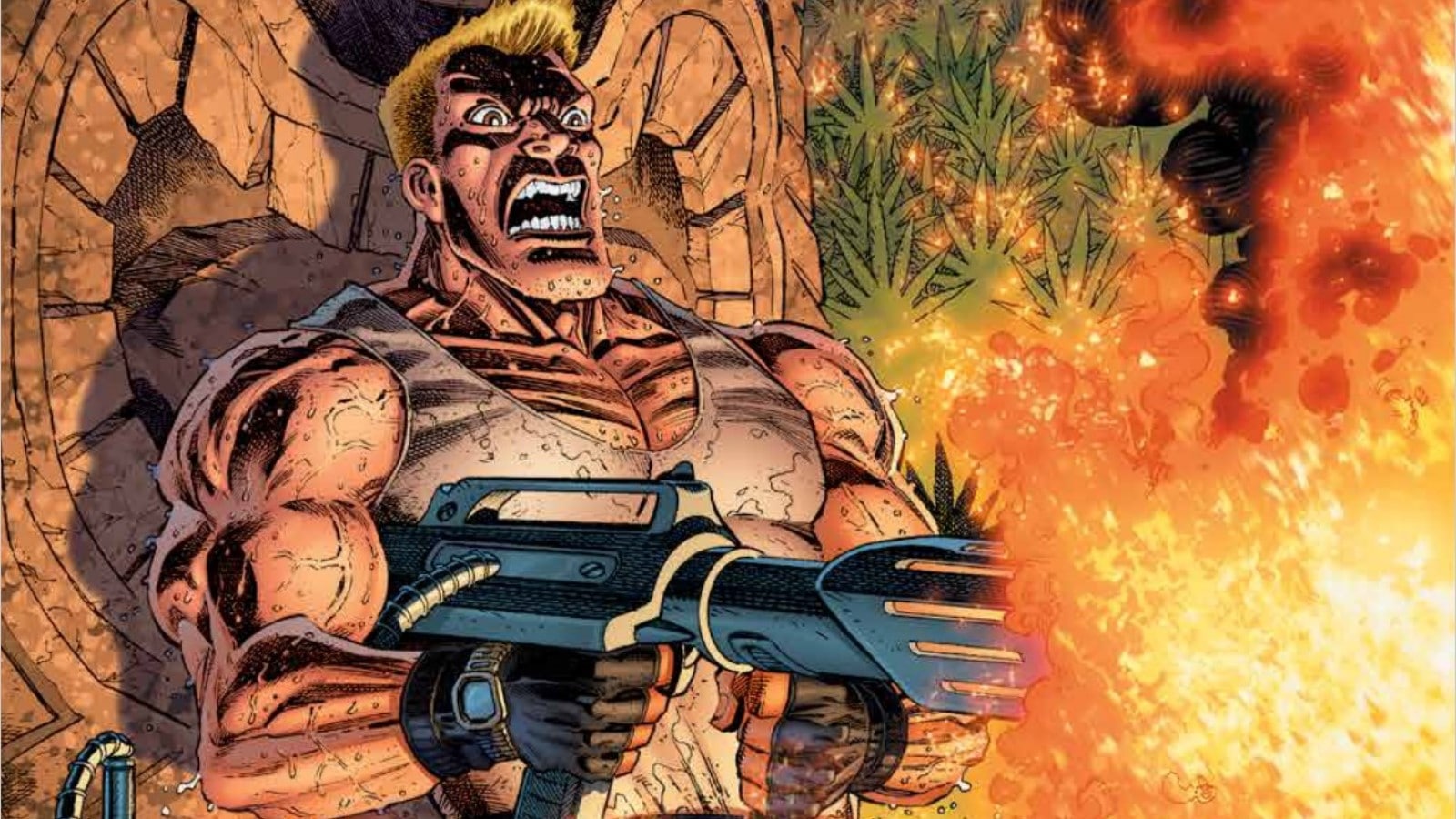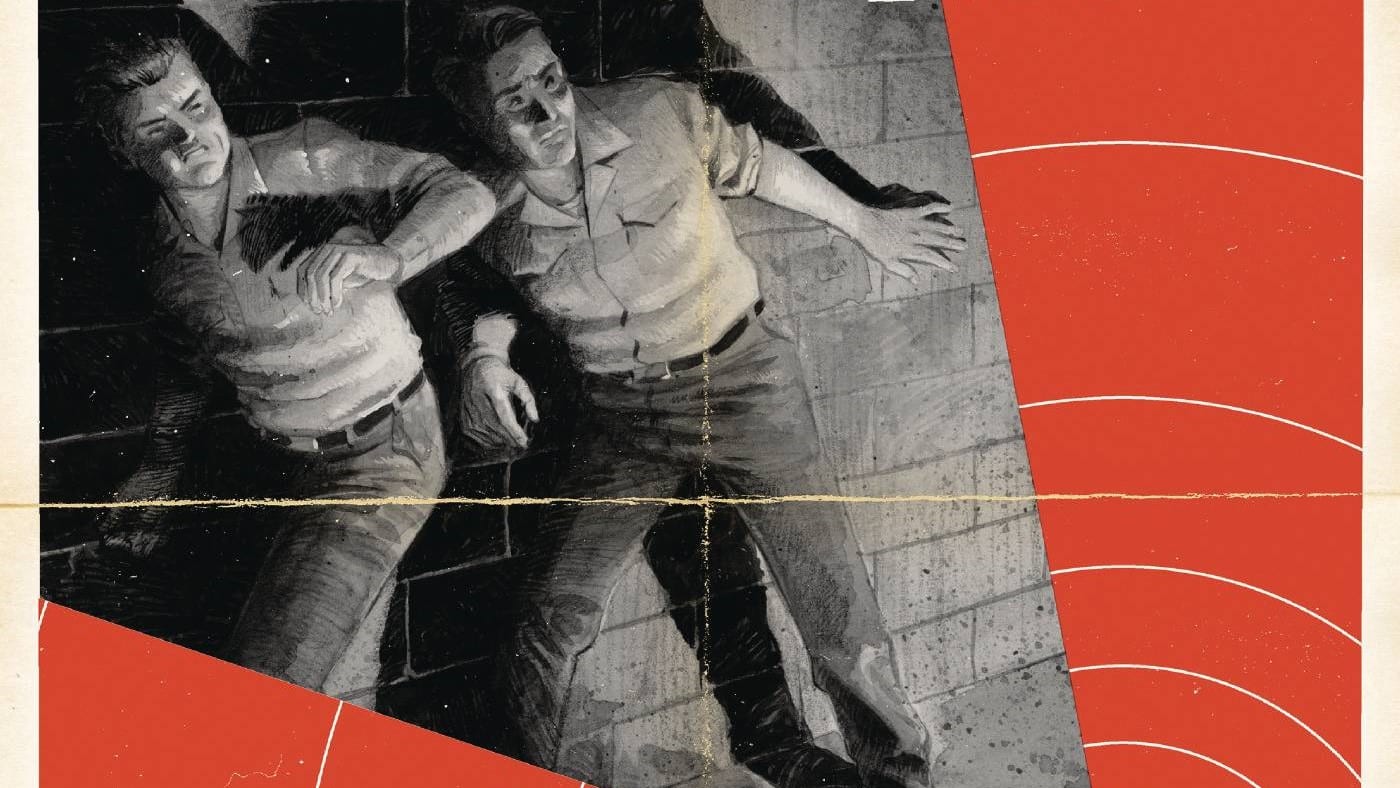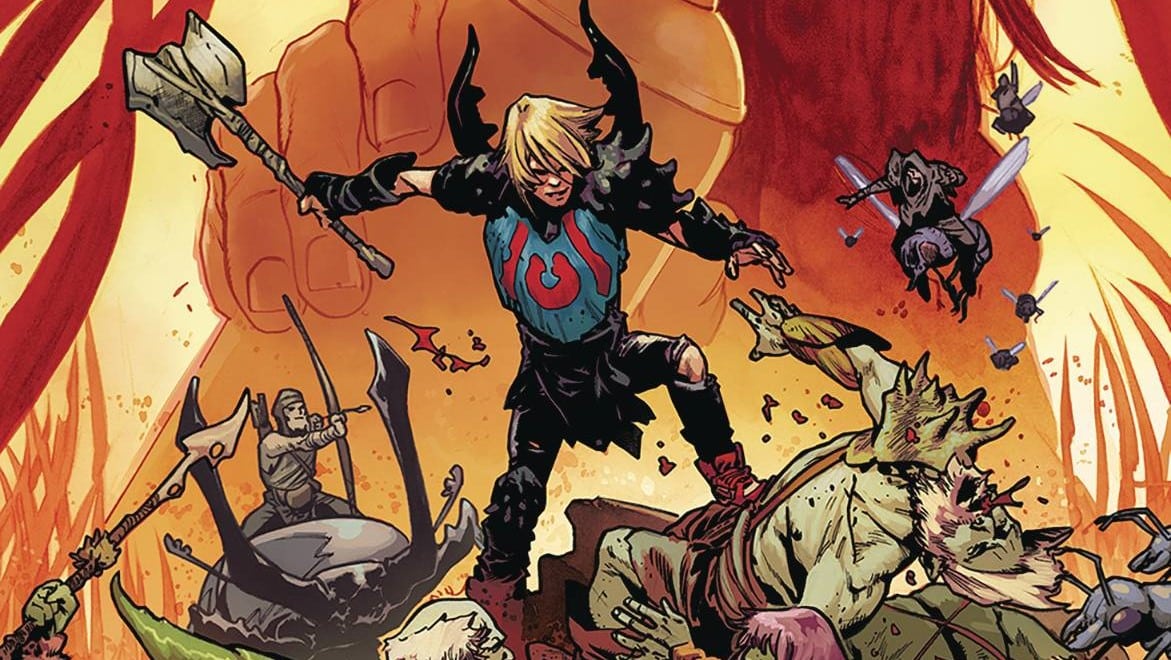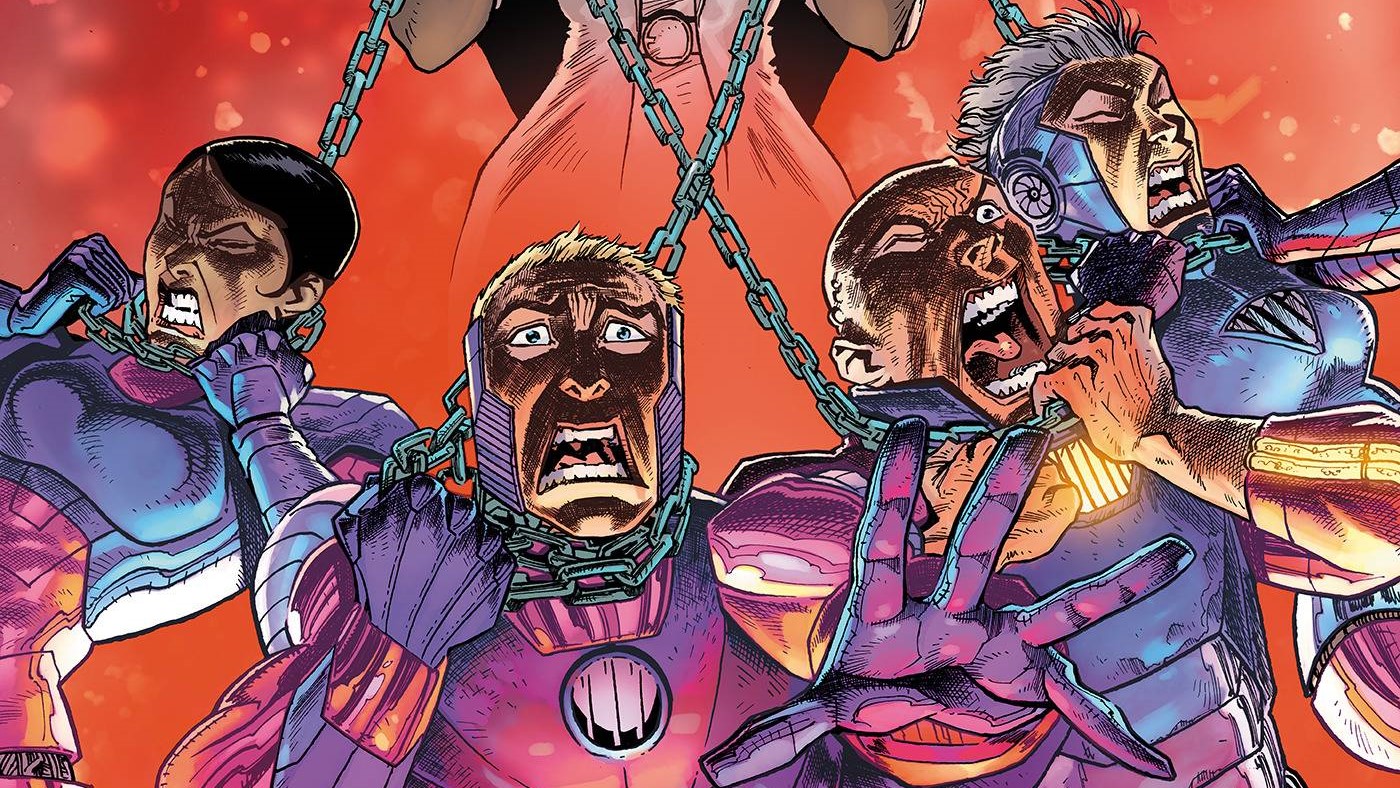What if the war on drugs was just one guy, man, and he decided to give it up? Get real high and read The Secret History of the War on Weed, written by Gerry Duggan and Brian Posehn, with art by Scott Koblish, colors by Hi-Fi, lettered by Clayton Cowles and published by Image.
Ahhh, shit, it’s this asshole again? Deadpool: Bad Blood #1, with story by Rob Liefeld, script by Chris Sims and Chad Bowers, pencils by Liefeld, inks by Liefeld, Shelby Robertson, Adelso Corona and Marat Mychaels, colors by Romulo Fajardo Jr., letters by Joe Sabino and published by Marvel.
What’s a dream? What’s a nightmare? What’s real? Are we high? No, it’s Slumber #2, written by Tyler Burton Smith, illustrated by Vanessa Cardinali, colored by Simon Robins, lettered by Steve Wands and published by Image.
Will Nevin: Ian, when’s the last time you did a weed? You can tell me — I’m not a narc.
Ian Gregory: You know, Will, you keep asking me about my drug habits. Remember, if I ask, you have to tell me: Are you a cop?
Will: I’m not a cop … probably.
Ian: I’ll answer anyway. To be honest, I’ve got no clue. I know that at some point in 2017 I giggled so hard at a riff my friend played on a synthesizer that I almost passed out, and it’s all been downhill from there.
Will: It’s been maybe … 10 years for me? I was a social toker; if it was happening at a party, I’d go for it, but I couldn’t possibly be bothered to buy my own. I wouldn’t even know where to start today. Like, would I go to one of my students? Ask if they knew someone? Anyway, happy belated 4/20 to you and anyone else who observes.
Ian: Good for them, and good for my neighbors who smoke out their window and the smell drifts down two stories into my open windows. It makes me feel like I’m part of a community.
The Secret History of the War on Weed: Goddamned NFTs

Will: Before we get into the merits of War on Weed, we gotta talk about the shittiness it found itself in when Image announced an NFT produced in conjunction with the Bored Ape brand of what’s definitely not a scam/bubble bound to burst at any moment. Say what you want about NFTs and how they’re literally one of the stupidest things to ever exist, but I gotta wonder: Did Duggan and Posehn have anything to do with this? Because while Duggan owns the copyright to the book itself, comic book letterer Chris Ross posited the NFT itself might belong to Image’s director of sales.
I dunno, Ian, this seems like a big, stupid pile of shit.
Ian: It’s hard to convey the instant revulsion that came over me when I opened Twitter to see this alternate cover. In many ways I feel bad for Duggan and Posehn because now my opinion of this book has been unchangeably altered by this dumb ape. I have my doubts that they really pushed hard for the Bored Ape NFT Alternate Cover (ugggghhhh), but we really have no way of knowing. Either way, Image clearly thought the audience for this book and the audience for Bored Ape NFT Alternate Covers (uggggghhhhh) was similar. I wish I had read this book before I saw the cover, because now I can’t read this book without feeling the shroud of lameness that hangs over it.
Will: And really, the NFT nonsense is a shame because it only detracts from a book that 1) reunites my favorite Deadpool creative team, 2) is a pretty good sendup of cheesy 1980s action movies, 3) takes a California-sized steamer on Nancy Reagan and 4) acknowledges the disproportionate toll the war on drugs has wrought upon communities of color. It’s a real blessing to walk into a book without any knowledge of its contents, and I gotta admit, I was expecting a straight retelling of the history here. Why I thought that with the involvement of a stand-up comic I do not know, but my point is, this was a good and fun time — like a real nice Kyle Starks action comedy with art that went a bit harder.
Ian: I’m afraid I didn’t really like this one. I also was expecting more of a history (my fault for not reading the solicits, I suppose), but I was also down for an action-movie parody. I think it got a little too far afield from what I thought were the interesting parts of the story (the role of the Reagans in advancing the war on drugs, and the material consequences for people caught up in that war) to focus on the less-interesting parts (weed jokes; people getting dismembered; things blowing up).
I also did a bit of an eye-roll at Scotch McTiernan, our villain-turned-hero, having a true “come to god” moment after smoking some weed. Thematically, for what themes we have here, I suppose it makes sense, but it felt mainly like an excuse to draw an (admittedly pretty) dream sequence. What keeps this book in the “alright” zone for me is that the creative team are donating a portion of their profits to a number of charities. If this story just elided the actual, serious harm done to people of color in exchange for some cheap weed jokes, I think I would have been really frustrated.
Will: Posehn and Duggan are a great team, and this really brought me back to some of those great Deadpool arcs like “Dead Presidents” and “The Good, The Bad and The Ugly.” I’d love to see more Scotch McTiernan — what about you?
Ian: I feel like Scotch McTiernan just took up too much space in a story that could have been interesting. For a 45-page comic, I feel like we actually learned very little about the history of the war on weed, and a whole lot about the ways Scotch McTiernan would kick someone’s ass.
Will: Maybe we should have been high when we read it.
Deadpool: Bad (Boring) Blood #1

Will: OK, I know we said we’d never do a Big Two book in this here space, but this was too tasty to pass up. Way back in 2017 — before we’d ever heard of coronavirus or Zoom or “high schooler Ian Gregory” — creaky fossil and not-good-at-feet guy Rob Liefeld released a Deadpool OGN, “Bad Blood,” and now, Marvel is releasing that book in serialized form. It’s a leftover from a leftover, Ian. I couldn’t resist picking it up.
Although having read it, I kinda wish I hadn’t. Deadpool can be many things — zany, irritating, meta, genuinely funny — but one thing he should never be is boring, and this was a 20-ish page chunk of story that read like 40. What a snoozer.
Ian: Hey — I’ll have you know I was in college in 2017 [Grote’s note: Christ.], and in the planning stages of what would become my pocketbook on Rob Liefeld. As a result, I am legally and physically incapable of resisting an opportunity to review a Rob Liefeld book. Has this been detrimental to my mental health? Absolutely. Will I stop? No.
Will: It’s like me and whatever shit Sean Gordon Murphy puts out. I JUST CAN’T HELP MYSELF.
Ian: This has every hallmark of a 2010-era Liefeld story: self-aggrandizing about Deadpool’s popularity, the appearance of original (first 12 issues) X-Force and references to characters no one cares about or remembers (Tolliver). For a fan like me, this is a buffet of Liefeld-ism. For everyone else? Skip it.
Will: Liefeld is only credited with the story and pencils, and neither is great. (Is he leaning into the foot thing now? He must be.) I also wasn’t high on the colors, which have all the vibrancy of a sun-faded billboard. Was there anything here you liked?
Ian: Bowers was Liefeld’s scripter on the similarly titled Snake Eyes: Deadgame, and here we’ve got both Bowers and Sims (best known together for X-Men ‘92). They’re doing their best with the script, but they have to work overtime to catch the reader up to the status quo of X-Force circa 1991, which leads to a lot of clunky dialogue. Deadpool pretty much never works for me either, so the jokes are just stale.
The real weak link in this issue is Liefeld’s pencils. There’s a panel where Shatterstar and Reaper appear to be bumping butts in mid-air. A few pages later, Cable stands at attention, his gun pointing off to the side as it fires at the nearby wall, somehow blowing up the door in front of him. It smacks of an old Liefeld trick: drawing a page, realizing it doesn’t make sense in continuity, and trying to cover it up with some explosive effects. Normally he makes his scripters cover up art errors, so I suppose this is an improvement.
Will: I’m not sure if there’s anything that would get me to read the second chapter — this was just so blah, which is, again, not what I want from my DP.
Ian: I’ve seen all I need to see. What made Liefeld a compelling creator in the late ’80s and early ’90s was his unpredictability: He was constantly introducing new characters, new agencies and new weapons. Now, everything is paint-by-numbers. It’s always the exact same characters, the same groups, the same stories. It’s as if Liefeld had a fixed amount of creativity he used up by the time he turned 30.
Will: 30. Oh to be young again. *dies*
Slumber #2: Haven’t You Always Wanted to Question Reality?

Will: I think we both had the feeling that the second issue in this series would be better than the first, which seemed to jump around without settling on a hook to get us into the book. And you know? We were right — narratively, with its focus on a cop who can’t stop killing in his sleep, this is much sharper. And the art is every bit as lurid as the first issue.
Ian: If things felt a little scattered and strangely paced in the last issue, I think bringing together the two threads (the dream hunters and the detective) put everything into focus. We also get to see some of the material downsides of being a dream hunter — Stetson can’t stop dreaming, even while awake, and it impairs her ability to live a normal life. Decades of seeing everyone’s nightmares, and killing nightmares, have made her a wreck.
Will: I don’t remember whether this came up last time, but I thought Stetson’s recurring need to question her reality was a nice touch. Her work’s definitely not the sort you want to take home with you.
Ian: I also like that, despite the dream-logic and fantastical elements, Slumber is approaching something of a detective story. We’ve got an informant (the on-again off-again demon that Stetson sleeps with), a detective, a private eye and a serial killer. With fantasy and science-fictional murder mysteries, it’s easy for everything to get lost in the “rules” of the setting. Here, we’re coming from the characters first. We see how Valkira is affecting Stetson and Finch, and that’s driving the story, not the mechanics of dream-walking.
Will: I’m down for #3 if you are. Buuuuut I’m pretty sure we’re done with Bad Blood.
Does This Smell OK To You?
- “I can’t believe he lied about his age in Vietnam!” “He was in seventh grade!” “He told me he was in fourth!” Okay, Duggan, you got me.
- Or was that Posehn?
- Liefeld has committed the cardinal sin of illustrating Cable: He gave him a gun that is basically just a tube with a handle. Come on, man, have some fun with it!
- After a year in storage, marijuana loses approximately 16% of its THC, a loss which increases to more than 40% after four years. Weed also, according to the same random website Will found, loses “its aroma, texture and flavor over time.”
- Wine gummies and wine ice cubes seem like the funnest things from this list of suggestions about what to do with leftover wine, but sure, go ahead and make vinegar if you want. Or you could, you know, just buy that instead.
- While you can cook with it (bourbon baked beans, anyone?), leftover whiskey is better off in your own house blend. (Will has one that he’s not that careful with, and Ian isn’t old enough to drink … probably.)
- Will really wanted to say “Fucking” in the headline but didn’t want to push his luck with editor Dan.
- [Grote’s note: Yeah, that was a smart fucking play.]







